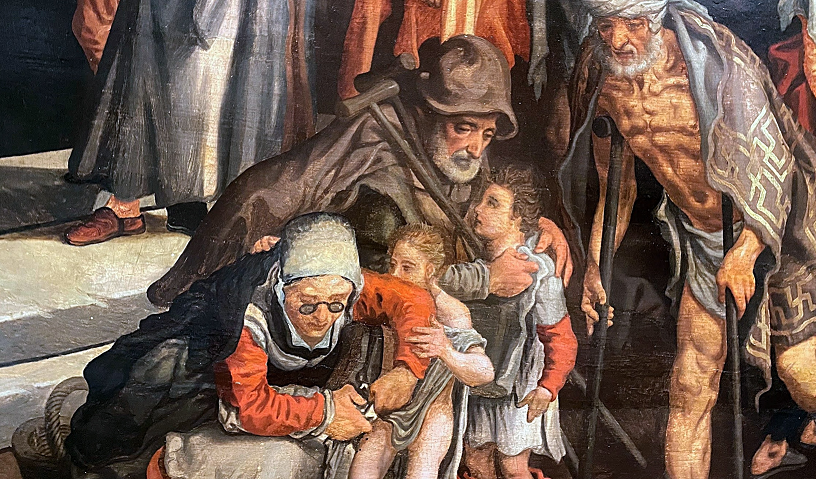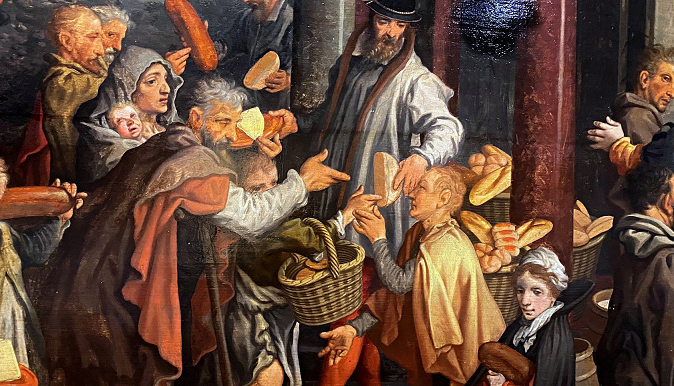#TomorrowIsSunday (EN+ES) | How can being rich help you to be saved?


Tha acts of charity, PhotoCredit: Sr. Amata CSFN
26th Sunday of Ordinary Time, Year C
Sunday, Septemer 25, 2022
Gospel of Luke 16: 19-31
EN: https://bible.usccb.org/bible/readings/092522.cfm
You can download the commentary on the Gospel and beautiful photos:
https://www.academia.edu/87208825/How_can_being_rich_help_you_to_be_saved?source=swp_share
*
XXVI Domingo del Tiempo Ordinario, Año C
Domingo, 25 de septiembre de 2022
Evangelio de San Lucas 16: 19-31
ES: https://bible.usccb.org/es/bible/lecturas/092522.cfm
1. By way of introduction
We sometimes wonder why the rich man was eternally condemned and poor Lazarus was saved. Naturally, this is not the question of money. The real reason is different. The reading of these verses of the Gospel based on the Greek original is very instructive here.
2. Key words
Lying at his door was a poor man named Lazarus, covered with sores.
The original says that the beggar was “cast away, dropped” (Greek ballo). Interestingly, the very same word is used for depositing money with bankers. Some commentators make an interesting observation here. The rich man was like a banker. God has deposited a treasure at the entrance to his palace (ballo). Lazarus was the treasure. He was the ticket to the eternal happiness of the rich man, who however did not take advantage of it (Fr. P. Śliwiński, Fr. M. Kowalski).
It was not being rich or comfortable in life that was the reason for the condemnation of the man living in the palace, but the fact that he did not take care of the man in need, whom God had placed in his path, literally “deposited with him.” And as we can see from this parable, our actions bear consequences for our lives even into eternity.
If they will not listen to Moses and the prophets, neither will they be persuaded if someone should rise from the dead.
Abraham’s words are a rebuke. If one disregards the Scriptures, the Gospel, one will also disregard other signs, even supernatural ones.
3. Today
Do I care for those in need whom God has “deposited” on my life’s path? How do I use what I have for the good of others? When was the last time I actually offered help?

Tha acts of charity, PhotoCredit: Sr. Amata CSFN
*
1. Unas palabras de introducción
A veces nos preguntamos por qué el rico fue condenado y Lázaro se salvó. Por supuesto, no se trata de dinero. La verdadera razón es otra. Una lectura de este evangelio basada en el original griego nos ayuda a descubrirlo.
2. Palabras clave
«Y un mendigo, llamado Lázaro, yacía a la entrada de su casa, cubierto de llagas (…)»
Literalmente está escrito que el mendigo ‘fue abandonado, fue abatido’ (ballo en griego). Curiosamente, la misma palabra significa depositar dinero en los bancos. Algunos comentaristas comparten una observación muy interesante. Bueno, el hombre rico era como un banquero. A la entrada de su palacio, Dios le depositó un tesoro (ballo). Ese tesoro era Lázaro. Era el pase a la felicidad eterna para el rico, que, sin embargo, no lo utilizó (padre P. Sliwinski, padre M. Kowalski).
No fue el hecho de ser rico o de tener la vida cómoda lo que llevo a la condenación del hombre que vivía en el palacio, sino el hecho de que no se ocupara del necesitado que Dios había puesto en su camino, literalmente ‘depositado con él’. Y como podemos ver en esta parábola, nuestras acciones tienen consecuencias para nuestra vida incluso para la eternidad.
«Si no escuchan a Moisés y a los profetas, no harán caso, ni aunque resucite un muerto.»
Estas palabras de Abraham son un reproche. Si uno hace caso omiso de las Escrituras, del Evangelio, también hará caso omiso de otros signos, incluso sobrenaturales.
3. Hoy
¿Me preocupo por las personas necesitadas que Dios ha ‘depositado’ en mi camino de vida? ¿Cómo utilizo lo que tengo para el bien de los demás? ¿Cuándo fue la última vez que ayudé a alguien?
You can read also:
#TomorrowIsSunday (EN+ES) | What did Jesus say about money? >>>
#TomorrowIsSunday (EN+ES) | What is the personalism of Jesus? >>>
#TomorrowIsSunday (EN+ES) | Is humility a weakness? >>>
#TomorrowIsSunday (EN+ES) | Who will be saved? >>>
#TomorrowIsSunday (EN+ES) | Why does Jesus bring division? >>>
#TomorrowIsSunday (EN+ES) | Does God wait on us? >>>
#TomorrowIsSunday (EN+ES) | Money is a good servant, but a bad master >>>
#TomorrowIsSunday (EN+ES) A third of the Lord’s Prayer is about forgiveness >>>
#TomorrowIsSunday (EN+ES) | Our neighbour – a stranger, someone we do not know? >>>
#TomorrowIsSunday (EN+ES) | Jesus’ manual for preachers of the Gospel >>>
#TomorrowIsSunday (EN+ES) | Why did Jesus live as if he were homeless? >>>
TomorrowIsSunday (EN+ES) | Corpus Christi. What is the miracle? >>>
#TomorrowIsSunday (EN+ES) | What does the Trinity teach us? >>>
#TomorrowIsSunday (EN+ES) | What does Jesus call the Holy Spirit? >>>
#TomorrowIsSunday (EN+ES) | How does Jesus continue to help us after the Ascension? >>>
#TomorrowIsSunday (EN+ES) | How can God dwell in us? >>>
#TomorrowIsSunday (EN+ES) | What kind of love is best? >>>
#TomorrowIsSunday (EN + ES) | How to hear Jesus? >>>
#TomorrowIsSunday (EN+ES) | What rebuilds a relationship with Jesus? >>>
#TomorrowIsSunday (EN+ES) | Why is this Sunday Compared to a “Second Baptism”? >>>
#TomorrowIsSunday (EN+ES) | Jesus’ greatest miracle >>>
#TomorrowIsSunday | What does Jesus write in the sand? >>>
#TomorrowIsSunday (EN+ES) | What is the scandal of mercy? >>>
#TomorrowIsSunday (EN+ES) | Why Does Jesus Pray? >>>
#TomorrowIsSunday (EN+ES) | What Should One Do when Tempted? >>>
#TomorrowIsSunday (EN+ES) | What Do a Hypocrite and a Mask Have in Common? >>>
#TomorrowIsSunday (EN+ES) | Why should we love our enemies? >>>
#TomorrowIsSunday (EN+ES) | Jesus’ Counsel Regarding Hatred Prompted by Faith >>>
#TomorrowIsSunday (En+ES) | In the Bible, what does it mean to be “fisher of men”? >>>
#TomorrowIsSunday (EN+ES) | Why is Nazareth a Tragic City? >>>
#TomorrowIsSunday (EN+ES) | Who is Theophilus for whom Luke wrote the Gospel? >>>



Dodaj komentarz